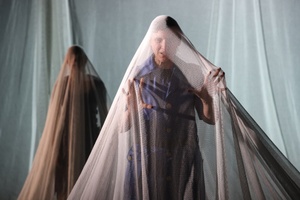In the organizer's words:
Medea
after Euripides
What does a promise cost? How much does an oath weigh? How heavy is a word given? The story of Medea and Jason has fascinated us for thousands of years: a love as great as that of Romeo and Juliet and one that leads to catastrophe. Woman and man, love and calculation, home and foreignness, right and wrong - these are the themes of the play, which begins with a promise that is broken.
Medea has helped Jason in her native Colchis, protected him, killed for him and he has given his word to love her and live with her. They flee together to his home in Corinth and live there on the fringes of society, which does not want to accept Medea, the foreigner, the barbarian, as an equal, while they welcome Jason, the Greek hero, as one of their own.
Nevertheless, the two live there peacefully for ten years with their two children, until Jason marries the king's daughter without Medea's knowledge in order to rise socially. This shakes Medea to the core of her being: the man for whom she has betrayed and abandoned her home and family turns against her to such an extent that she is even driven out of the country with their children. She publicly deals with the pain of her broken vow, her disappointment and her boundless anger. She takes the audience with her in her struggle for justice to a point where even her closest confidante can no longer follow her: the murder of her own children in order to completely destroy Jason.
Euripides wants to understand his characters, he does not judge, he does not speak in terms of guilt and in this he proves to be impressively topical. He passes on the question of responsibility to us and supports it through the presence of a chorus of speakers who represent the people of Corinth and thus us, society. How can we take a stand? How far does our fear of foreigners drive us, who do we close the door to and who do we welcome?
The choir
A choir of dedicated amateurs takes part in the performances in Bremen. The theater group was formed shortly after the Corona period and was born out of the idea of overcoming the distance between theater and audience imposed by the pandemic. The amateur choir was to be open to anyone interested and the aim from the outset was to put the choir on stage together with the professionals in the production of "Medea" in the fall of 2023. Classically, the choir in Greek theater represents the "polis", in this case the society of Corinth.
Cast
Writing/directing: Petra-Janina Schultz.
Stage/costumes: Rike Schimitschek.
Choreography: Leila Bakhtali.
Assistant director: Linus Wirth.
With: Svea Auerbach, Michael Meyer, Ulrike Knospe, Markus Seuß.
Chorus: Michael Csont, Karin Dörpmund, Fabi Heuermann, Anja Hölscher, Larissa Kroll, Sandra Luther, Julia Odermatt, Bettina Renken, Nastja Roeseler, Pia Schreiber, Steph Seumer, Melanie Tröster, Dine Urbons, Doris Wind.
Duration: 1:30 without intermission
Performance language: German
This content has been machine translated.Price information:
normal: 25 € reduced: 14 € Students of the University, HS and HfK Bremen and HKS Ottersberg: Free admission













